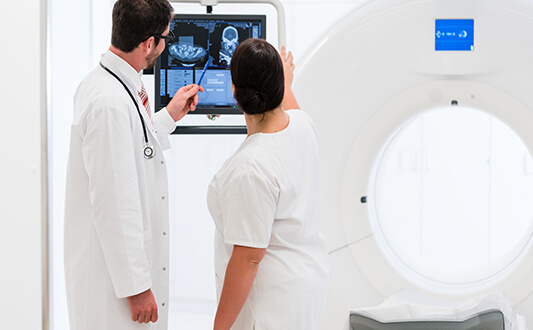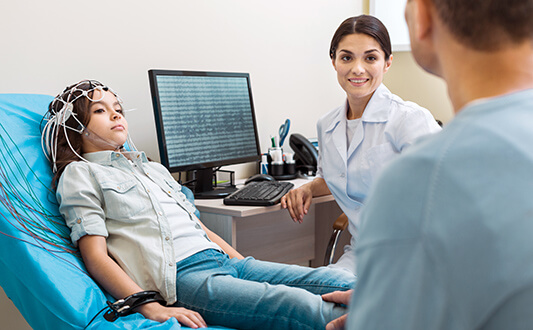According to the Euro Health Consumer Index 2009, Germany has the most high-technology and consumer-oriented health care system among all European countries, particularly pediatric care. Due to a large number of hospitals, same-day access to pediatricians is a routine here. The scheduled inpatient care often requires being on the waiting list, especially in case of invasive or complicated interventions. However, the excellent treatment results make it worth waiting for. Due to these, pediatric medical centers in Germany are also asked-for for patients from other countries. Fortunately, peculiarities of German health care allow admitting non-residents in case of correct papers preparation and self-payment.
Content
- Benefits of German pediatrics
- Peculiarities of treating cancer in children
- Peculiarities in treating cardiological pathologies in children
- Peculiarities of neurological and orthopedic rehabilitation in children
- Leading German hospitals and costs of treatment
- Treating your child in Germany with Booking Health
Benefits of German pediatrics
Each branch of child health care in Germany has its own peculiarities and advantages. Cardiac surgeons will tell you about the small surgical equipment and reliable materials for heart defect correction. Rehabilitation therapists will tell you about novel nerve stimulation methods, biological feedback, etc. However, common features allow German pediatric services to be successful, safe, and convenient for both children and parents. These include the following:
- If a child needs to be admitted to a hospital, one of the parents can stay with him in the ward. Of course, staying in the Intensive Care Unit is an exception. Being close to his parent, a child feels safer and tolerates treatment better. In addition, a parent can ask healthcare professionals questions about further maintaining therapy, postoperative care, rehabilitation, etc.
- All the diagnostic and therapeutic interventions are painless, and used anesthesia is safe. This improves the accuracy of the diagnostic data (as a child does not move or cry) and excludes unnecessary fears.
- German doctors pay attention to the safety of medications regarding a child's further physical and mental development, especially in case of life-long treatment. Sometimes, the drugs that are absolutely indicated for the treatment of certain pathology may negatively affect other organs. For instance, some antibiotics can affect hearing, and so on. Only drugs with good safety profiles are included in the pediatric treatment regimens in Germany.
In addition, the diagnostic and therapeutic equipment is always adjusted to the sizes of children’s organs. This concerns ultrasound probes, tracheal cannulas, urethral catheters, catheters for endovascular interventions, and other medical devices.
The peculiarities and strengths of separate fields of pediatrics in Germany are described below.
Peculiarities of treating cancer in children
The most widespread pediatric cancers are leukemias (acute lymphoblastic and myeloid leukemia), lymphomas (non-Hodgkin and Hodgkin lymphoma), medulloblastoma, neuroblastoma, low-grade glioma, and Ewing sarcoma.
When it comes to hematologic malignancies, i.e., leukemias and lymphomas, German hospitals offer such novel and efficient therapeutic options:
- Targeted therapy is performed after genome analysis and the detection of gene aberrations associated with oncology development. The targeted therapy significantly prolongs the event-free survival period after being administered with chemotherapy
- Direct treatment of the central nervous system, i.e., brain and spinal cord. Intrathecal chemotherapy by injecting a drug into the brain and spinal cord meninges substitute the prophylactic irradiation of the skull. Avoiding this type of radiation therapy excludes the risks of developing radiotherapy-induced secondary tumors and neurocognitive deficits.
- CAR T-cell therapy is used in children with oncology relapses or resistance to the conventional treatments. Own leukocytes (T-cells) of a child are modified genetically, so they become able to recognize and destroy malignant cells.
- New formulas of chemotherapeutic agents characterized by lower toxicity are also used in German pediatric cancer protocols.
- Immunotherapy includes administration of monoclonal antibodies, i.e., proteins that connect to the specific superficial markers on malignant cells and eventually lead to irreversible damage. Immunotherapy is used as an addition to chemotherapy.
When it comes to the treatment of brain tumors, such as medulloblastoma or neuroblastoma, German oncologists start with the maximal surgery followed by the multi-agent chemotherapy. The conventional therapeutic regimen includes irradiation of the skull and spine, which always damage children’s immature brain and spinal cord. That is why German protocols give preference to more sparing polychemotherapy.
In the case of neuroblastoma, targeted radiotherapy is also used. The MIBG molecules are connected with radioactive Iodine-131 and a radiosensitizer. MIBG finds and binds to neuroblastoma cells, while Iodine-131 and radiosensitizer destroy them.
Peculiarities in treating cardiological pathologies in children
Congenital heart defects are the most common cardiological pathologies in children. Some of the defects are detected even before birth. Others manifest themselves during the first weeks or years of life.
German cardiologists and cardiac surgeons successfully carry out fetal cardiac interventions, i.e., correct a heart defect before birth. This requires outstanding skills and relevant experience but significantly improves a child’s condition. The intervention is performed in fetuses with such pathologies:
- Complete heart block
- Hypoplastic left heart syndrome with preserved atrial septum
- Hypoplastic left heart syndrome with critical stenosis of the aorta
When the heart defect is diagnosed after birth, the most sparing and well-tolerated therapeutic option is cardiac catheterization. Such surgeries are carried out through several centimeter cuts in the subclavian or femoral artery. They successfully substitute open-heart surgeries in children who require plasty of large blood vessels (e.g., aorta, pulmonary arteries, or veins), stent implantation to restore blood flow, valvuloplasty, plastics of the atrial or ventricular septal defects, occlusion procedures (e.g., patent foramen ovale).
Peculiarities of neurological and orthopedic rehabilitation in children
Rehabilitation improves the condition of children with birth injuries, cerebral palsy, pathologies of large joints, and congenital neurological disorders. Ratherish opposite to treatment, rehabilitation does not promise immediate improvement or a complete cure. It requires systematic and continuous work under the guidance of a skilled rehabilitation therapist. Availability of medical equipment and follow-up examinations are significant as well.
In Germany, pediatric rehabilitation usually starts in specialized centers under the constant supervision of healthcare professionals. Parents learn how to continue rehabilitation at home or in their native country during the inpatient course. Depending on the medical condition, the course of restorative measures may include the following:
- Individual physiotherapy
- Kinesiotherapy
- Hydrotherapy
- Thermotherapy (fangotherapy, paraffin baths, etc.)
- Deep tissue massage
- Acupuncture
- Various types of respiratory gymnastics
- Transcranial magnetic stimulation (TNS)
- Castillo-Morales manual orofacial therapy
- Nerve electrostimulation with the biological feedback
- Microcurrent treatment
- Vojta therapy
- Proprioceptive neuromuscular facilitation
- Balance training: Wii Fit
- Restoring posture and walking ability: Lokomat, Armeo-power, TheraSuit system
- Restoring hand function: Amadeo system
- Neuropsychological therapy
- Individual psychotherapy sessions and group therapy
- Occupational therapy
- Logopedia
- Supportive drug therapy (antispasmodics, neuroprotective agents, etc.)
German rehabilitologists carefully assess a child’s response to restorative measures. Based on the results of follow-up tests, they adjust the number and intensity of procedures to the current patient’s needs. In addition, rehabilitation centers for children usually do not look like hospitals with strict rules. Here children can communicate and play, continue their education in a distant form, etc.
Leading German hospitals and costs of treatment
By tradition, university hospitals demonstrate the highest success rates in making precise diagnoses, performing a conservative and invasive treatment, managing rare conditions, and carrying out rehabilitation. This is not altogether surprising since university hospitals are multidisciplinary, have the latest equipment, employ the best healthcare practitioners, and are engaged in clinical trials and other types of scientific research.
Hospitals that are leading in pediatrics in Germany are listed below:
Children of all ages can undergo the basic examination and receive treatment at the Department of General Pediatrics, Pediatric Neurology, Metabolic Disorders, Gastroenterology and Nephrology. Head of the department, Prof. Dr. med. Georg Friedrich Hoffmann has the special Award of the German Society for the Study of Congenital Metabolic Disorders. The hospital also has pediatric departments for cardiac surgery, interventional radiology, cardiology, congenital heart diseases, etc.
Providing medical services to patients of all ages, this largest European hospital has separate pediatric departments of neurology, cardiology, nephrology, oncology and hematology, etc. Doctors at Charite University Hospital Berlin are ready to help little patients with rare inherited conditions, including the genetic ones. The new software for detecting disease-causing gene mutations is being developed in the hospital. This is a promising step that will contribute to earlier detection and more successful therapy of the genetic pathologies.
The Department of Pediatric and Adolescent Medicine offers initial diagnosis making and therapy. At the same time, more specialized treatments are carried out in the corresponding departments (e.g., the department of orthopedics, hand surgery, urology, etc.). The University Hospital Frankfurt-am-Main is famous for successful surgeries, including interventions on the brain. In addition, it offers stem cell transplantation, comprehensive treatment of immunological pathologies, and consultations for genetic disorders.
The healthcare institution is famous for the treatment of heart pathologies and interventions on the heart and large blood vessels, which are carried out at the Department of Pediatric Cardiology and Pediatric Intensive Care in cooperation with the Department of Cardiac Surgery. Children with all types of congenital heart defects can receive help there. Another field of special medical interest is the treatment of epilepsy, which is carried out at the Department of Pediatric Epileptology.
It is rather hard to distinguish one sphere of the hospital’s specialization, as it demonstrates excellent results in oncology and hematology, neuropediatrics and congenital metabolic disorders, surgical interventions, etc. In addition, the Department of Clinical Genetics offers diagnostic tests and consultations to parents who have a child with suspicion of a genetic syndrome. University Hospital Oldenburg is an excellent choice for difficult diagnostic cases and rare conditions in children.
It is impossible to determine one price for treatment of all children with the same pathology, as the therapeutic scheme is elaborated for each clinical case individually. However, we still can mention the approximate costs of the most popular medical options.
Treating your child in Germany with Booking Health
If you want your child to undergo treatment in the centers of modern pediatrics abroad but do not have experience of arranging treatment abroad, it is better to contact Booking Health.
Booking Health is a medical tourism operator that has been organizing the treatment of children from 75 countries in the leading German hospitals for more than ten years. Its specialists know the peculiarities of pediatric treatments and the strengths of particular healthcare facilities.
Booking Health will help you with:
- Choosing the right pediatric hospital in Germany
- Preliminary distant communication with your physician, including getting a second opinion
- Preparing the necessary medical program in advance, without repeating previous diagnostic procedures
- Booking the appointment for outpatient or inpatient treatment; on the necessary date
- Providing favorable costs for medical services, without additional fees for foreign patients (saving up to 50% of the initial cost of treatment)
- Independent control of invoices
- Additional monitoring of medical program during its implementation
- Help in buying and forwarding of drugs, medical products, etc.
- Organization of additional diagnostic procedures, if necessary
- Communication with the hospital after the completion of treatment, planning of follow-up procedures
- Offering services of the highest level: booking accommodation and tickets, transfer, etc.
- Services of interpreter and personal medical coordinator
Your first step includes leaving the request with basic medical information on the website of Booking Health. A patient case manager or medical advisor will contact you the same day to discuss the necessary details and support you through the whole treatment process.
Choose treatment abroad and you will get the best results surely!
Authors:
This article was edited by medical experts, board-certified doctors Dr. Nadezhda Ivanisova, and Dr. Bohdan Mykhalniuk. For the treatment of the conditions referred to in the article, you must consult a doctor; the information in the article is not intended for self-medication!
Our editorial policy, which details our commitment to accuracy and transparency, is available here. Click this link to review our policies.
Source:
Open Access Journals, Pediatrics Journals
Read:
Why Booking Health - questions and answers
How to make right decision when choosing the clinic and specialist
7 reasons to trust to the rating of clinics on the Booking Health portal
Don't know where to start?
Contact Booking Health







